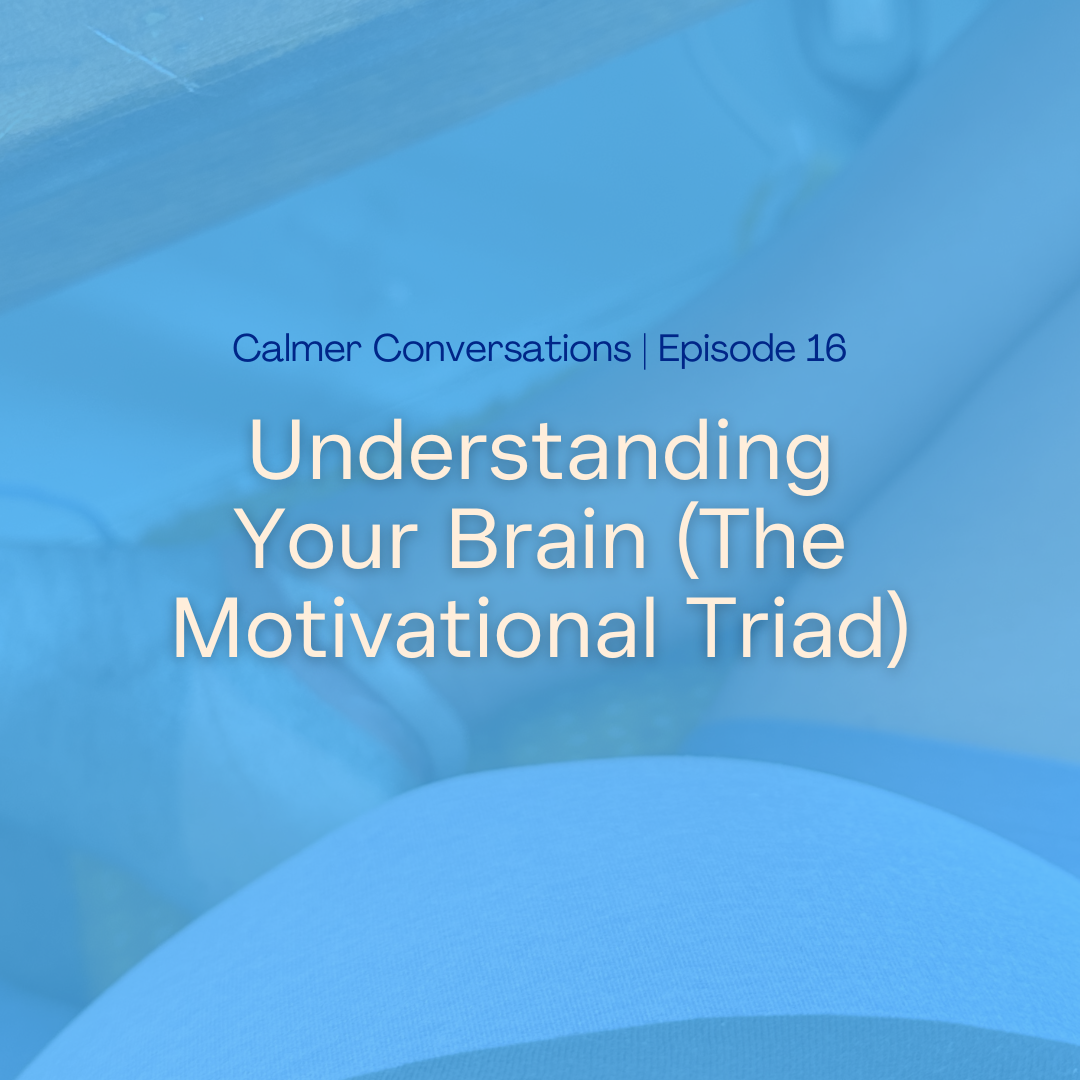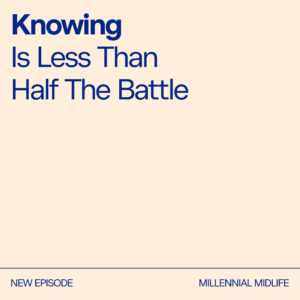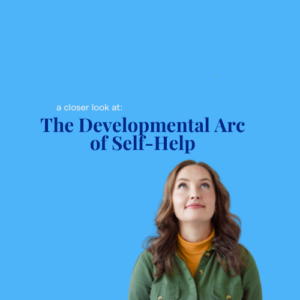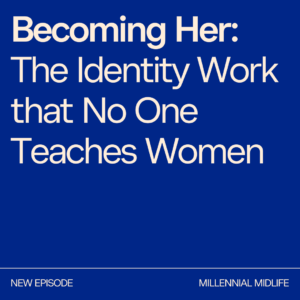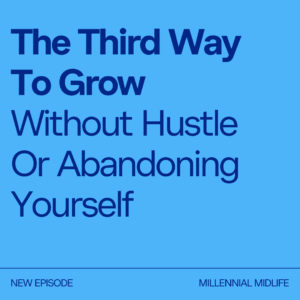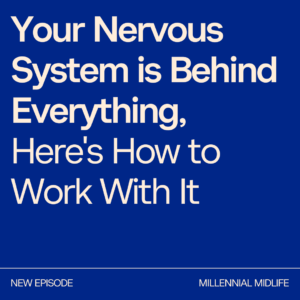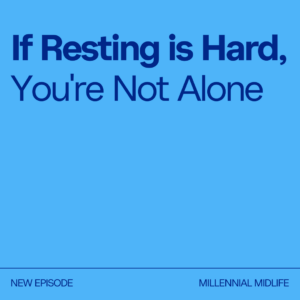Cecelia Baum Mandryk (00:01.59)
Hey, and welcome to Calmer Conversations, episode number 17. I’m Cecilia, your host, and today we’re going to talk about your brain. We’re gonna talk about the two different parts of your brain and motivational triad. So I wanna start out by asking you if you’ve ever done something like this. So there’s a part of you that really has this big goal. I’m gonna go with a fitness goal. Maybe you wanna run a 5K, maybe you wanna get in shape for a vacation that’s coming up or something like that.
And so you think I’m going to get up at 6 a.m. and I’m either going to go to the gym or I’m going to go for a run or something like that. And it sounds fantastic the night before. Totally on board. And you set your alarm and it all sounds great. And then 6 a.m. comes and the alarm goes off and you can’t remember exactly why you wanted to get up at 6 a.m. You almost automatically just hit snooze. If you don’t automatically hit snooze, rollover, say that was a terrible idea.
or yeah right or something else and then go back to sleep. If that sounds like you and it doesn’t have to be that exact instance but you’ve done something where something that sounded really great ahead of time then when you get in the moment it’s hard to execute that might be around, you know like maybe this is around your procrastination and it could be around anything then this episode is for you. Okay so we’re diving into like I said the two parts of the brain and the motivational triad.
And I think that this is, so for me and a lot of people that I work with, it’s really helpful to have explanations around things. And oftentimes once I have an explanation around something, it suddenly makes sense in my brain and then I can work with it differently. And a lot of the brain-based work that I do with clients and what I share on social media and what I share here has to do with understanding some of the mechanisms that are happening so that you can make change more easily in your life.
That’s exactly what we’re doing today. And I think that understanding some of the parts of your brain and how they work, really powerful for making changes. I will remind everybody that I’m not a medical doctor or a neuroscientist or anything like that. I’m a coach. I trained as a coach. I trained as a mental health counselor. And I also have trained as a yoga therapist and in breath work. Plus my own.
Cecelia Baum Mandryk (02:23.298)
long experience working with myself and working with a lot of other humans on their brain. So just know that that’s the kind of angle that I’m coming from and really instead of understanding the physiology of your brain, what I want you to do is understand what’s happening and how these different parts interact so that you can again work with them. So the way, and again, this is why what I just said is important, I’m gonna
put the brain into kind of like two main parts. So one of the parts is your more primitive brain. This could be called your lower brain or your downstairs brain or your reptilian brain. And the other part is the kind of higher functioning brain. So this is the part of you that thinks about your future, that has goals, that does kind of higher level interpretations of things. Those are the two different parts. You can use whatever words you would like to and resonate with you.
I’m going to use primitive brain and higher functioning brain just because those are the words that come most easily to me and will come out of my mouth most easily today. But feel free to substitute for whatever makes sense for you and for your brain. Okay, so you have these two different parts of your brain. One of the parts of your brain, the primitive part of your brain is responsible for keeping you alive.
and it’s the part of your brain that’s in charge moment to moment. So it’s the one that has more pull in the exact moment that you’re in right now. Now your higher functioning brain is less concerned about your direct survival, can interpret things in like time and space, can understand growth over time and commitment.
can is like your cognitive functioning brain. So cognitive brain is another word that I oftentimes use for this part of your brain. That’s the part of your brain that says, I have this goal of getting in shape and so I’m gonna wake up at six in the morning. I know that it’s gonna be uncomfortable, but this is important to me. Your primitive brain is the one that at six o’clock when the alarm goes off says, I don’t think so. We’re comfortable, we’re safe. That was a terrible idea.
Cecelia Baum Mandryk (04:43.222)
definitely not getting out of bed right now, we’re gonna stay put. So those are the two parts of your brain in like very, very quickly. But let’s explore them a little bit more and why it’s important if you’re trying to make change in your life and you wanna kind of get out of habits like procrastination or you just wanna maybe feel calmer or better in your life, right? So the primitive part of your brain has, it’s helpful to know I think about the motivational triad.
So it is motivated by three main things. One of them is keeping you alive. So that’s avoiding danger, right? So keeping you alive, that’s its main function. The other one is to conserve energy. So that in case you need energy to escape something dangerous, it’s there. And the third is to seek out pleasure, usually more hedonic pleasure. So like quick dopamine hits.
So you’re avoiding pain and seeking out pleasure in the moment with the idea that we’re going for survival But not thriving Really? So this part of your brain again, it’s it has this motivational triad and it is in charge in the moment again Because it’s in charge of keeping you alive This part of your brain
lacks a lot of nuance. So it has a hard time discerning between, for instance, a perceived threat or a threat that you’re imagining in your brain and a real threat, right? So an existential emotional threat is perceived like a real physical threat by this part of your brain. This is why if you think about that email you got from your boss at 11 p.m.
Suddenly your heart is racing and you can’t sleep because this part of your brain doesn’t know that you didn’t just receive that email and that email isn’t a threat to your existence. It thinks that it is actually dangerous. This is why people jump when their phone buzzes. This part of your brain just isn’t great with time. It’s not great with the difference between perceived and real threats. So it treats every, and this makes a lot of sense, right? If you think evolutionarily.
Cecelia Baum Mandryk (06:56.832)
In the moment of a threat, you don’t have time to say like, is this real or is it imagined? It’s much safer, it’s much more reliable to just treat everything as real, to react as if it is real and worry about it later. Okay. The other part of your brain is the part of your brain that is more concerned with you thriving, that is more concerned with your long-term goals, with how you want to be in the world, with what you want to achieve in the world, and with
maybe creating plans to get there. This part of your brain is also really great at cognitive thinking. It’s great at creativity. It’s great at making connections between other humans. It’s the part of your brain that gets excited about the project that you want to work on, even though at some point or within, you know, there’s some part of you that understands, this is going to require growth. It’s going to require, require acquiring new skills. It’s going to require doing something different in my life.
This part of your brain is okay with the discomfort of getting out of bed at six in the morning because it has this longer term goal. This part of your brain understands time in a different way and understands the difference between perceived threat, like I’m just thinking about the email and the email actually coming in. This part of your brain also understands that that email is not an actual threat to your life.
So this is the part of your brain that’s in charge a lot of the time. It’s the one that helps you think. It’s the one who says like, yes, I understand that intellectually. Yes, I understand that cognitively. It’s the part of your brain that most of us kind of like rely on. Or when we’re thinking about our brain, this is the one that comes up. So for instance, when I’m coaching someone and we’re going over some concept, a lot of people will cognitively understand it.
That’s why you can read a self-help book or a book about your brain and you can say, yes, I understand what that means cognitively. Cognitively, I get that I’m not actually in danger at six in the morning when my alarm goes off. But the issue is that in that moment, at six in the morning when the alarm goes off, your cognitive brain is not the one in charge. So your cognitive brain is not the one that’s making decisions at that point in time.
Cecelia Baum Mandryk (09:20.97)
And what that means is that you need to start to understand what’s happening in your more primitive brain because your more primitive brain is the one in control in the moment. This is the one that stores, that remembers kind of like how to survive as a kid. It fears out how to get its needs met, right? And they’re not always ways that make sense to our cognitive brain, but they are ways
that our primitive brain has figured out to conserve energy, to stay alive, and to in some ways get some pleasure. And that one’s kind of, you know, it’s really conserving energy and staying alive are primary functions here. And so for instance, if you were younger, you might have learned some strategies that seem maladaptive now, but they were adaptive then for getting your needs met. Like for instance, taking care of other people’s feelings.
or making yourself feel small or not succeeding too much or all these other things that don’t totally make sense to us now become part of the coding of our primitive brain. And this is the coding that if you don’t shift and change it as an adult will continue to kind of waylay your efforts to do something else. And I’m gonna give you a personal example about this that’s I think pretty interesting. So I…
was a geologist for a number of years. I worked as a geologist. Quitting geology was kind of, it was a challenge for my brain because it was how it was acceptable. It was, I learned that technical careers were the quote unquote good careers to have. made me, it was like a status symbol. know, there are all these different things involved in it. So I quit geology. I didn’t know quite what I wanted to do, but I knew that I didn’t want to work in geology anymore. I took time off
And then I was moving back, I was living overseas at the time, and I was moving back to the US. And I kind of, there was a part of me that thought when I moved back to the US, I can kind of make something different happen. I understand the system differently. It’s my like primary language. I am excited to kind of step into something, into a bigger version of myself. Well, I moved back.
Cecelia Baum Mandryk (11:42.602)
I moved back close to my parents. actually lived with my parents for the first couple of months or first month or two that I was back in the US. And I immediately started pursuing essentially an undergraduate and then master’s degree in accounting. So I came back and decided that I needed to take the GMAT, apply to a master’s in accounting, and do all the prerequisites for this accounting degree, this master’s degree, in the next year.
Now there are a couple things that are happening here, right? One of them is that I was back around my parents and so there was something about being acceptable to them and my primitive brain wanting to fit in with that so that I could quote unquote get my needs met, right? Like I’m an adult by this point. I don’t technically need my parents to get my needs met, but my brain is still programmed to need their approval. And my primitive brain,
wanted to do something to be more acceptable to them again. And I’m not putting any of this on them. This is all within my own brain, right? So accounting, well, it’s not geology. It’s a little bit more technical. It’s a more analytical field than, for instance, mental health counseling or coaching or teaching yoga, which is what I was doing at the time, or teaching cooking classes. I was also doing that. And then the other really interesting thing that happened that my brain was doing to keep me protected and keep me kind of in where
my zone of excellence or this area that felt really safe was it was making sure that I didn’t have any extra energy to use on the things that would put me on this other trajectory. Because if I’m using all my free time to study for the GMAT, to take the GMAT, to take an entire undergraduate curriculum of accounting before I got into the masters or before I was able to start the masters,
I was a little busy, right? Like all my free time was occupied by taking these classes, by focusing on this. And what that did was it kept me really safe, right? It kept me exactly who I was. I didn’t have any extra energy to go out there and put myself, and I’m using air quotes here again, in the path of danger, right? So I was not able to kind of…
Cecelia Baum Mandryk (14:04.45)
put effort into becoming a yoga teacher or to becoming a coach or to doing any of this because I was so concentrated on going this other path on all my energy was there. And this is a little bit of an extreme example, but our brains do this all the time. They keep us distracted with other tasks like laundry, like…
scrolling on your phone, all these things that we think we have to do or bring us little bits of dopamine. And honestly, like even doing laundry brings up most people a little bit of dopamine. Like you did something you were quote unquote supposed to do or you accomplished something, right? But it keeps you from doing the things that might be what your higher self wants or what you actually want to be doing to thrive in the world. And so this brain stuff runs really deep.
It’s like, it’s kind of, it shows up in all these really interesting ways, everything from I didn’t get out of bed at 6 a.m. to go for the run, to I spent an entire year of my life pursuing a profession that I didn’t actually want to pursue. I mean, but the great thing from my brain’s perspective, the primitive part of my brain, is I spent an entire year of my life not being in the way of danger by pursuing this other path.
So that I was still acceptable, so that I was still in my zone of safety. And so the really interesting thing I think about coaching, and in particular the coaching that I do, is it’s recognizing the thoughts that are keeping you stuck. So the thoughts that are keeping you in these patterns over and over again, and the nervous system states. Because while you might be really uncomfortable feeling anxious every single day,
the primitive part of your brain says this is the thing that has been keeping us alive and we are 100 % not changing this. We’re not changing this right now because this is the thing that’s keeping us alive. And so I want you to maybe think about if you are feeling stuck, and again, this could be on really small levels, like I don’t go to the gym, I don’t follow through on things, or it could be something really big, like I’ve been wanting to write my book and for some reason,
Cecelia Baum Mandryk (16:19.85)
I haven’t even sat down to like work on it or I’m so caught up in the timeline of the book that I haven’t done any of the writing for the book. Think about where that’s happening for you and then consider what it would be like if your primitive brain, if we were able to work with it and help it step out of the way a little bit. And how we do that and how you do that, I mean, it’s a longer term process than what I can address in a few minutes on a podcast episode. But essentially what we do is we’re doing a little bit of reparenting.
We’re doing a little bit of investigative work of understanding what is happening there so that you can shift and change it, so that you can change the patterning, that we first recognize it, right, and accept it, and then we can work with it to shift it so your brain no longer feels like it needs to go into these safety protective modes to keep you exactly where you are. Because again, that’s your primitive brain’s job. It wants to conserve energy, it doesn’t want you to be in danger, it doesn’t, most of our primitive brains will take
something like getting out of bed to go for a run and turn it into this really, really big threat, like we’re gonna die if we do it, right? So in order to work with your brain, you have to understand that these are two parts that are kind of at play and that if you can’t make space for your primitive brain, then you’re never going to be able to step into your like higher self and what you really wanna be doing in the world.
It’s really, and again, I mean that from a very small level to like, wanted to go for a run today, to a large, I wanted to start a company or I had this dream to do this thing. And most of us, because our cognitive brain is so powerful and we understand things on a cognitive level, oftentimes what happens is we think our primitive brain is being silly. We kind of push it away. We ignore it.
We think it’s ridiculous, we shame ourselves for it, all these different things. And what that really does is it kind of just locks the pattern in even more. And so what we wanna do is we wanna understand those patterns so that again, we can start to work with them. And this is the art to like science, the capacity to work with yourself. And I mentioned this, but I’m gonna say it one more time is that,
Cecelia Baum Mandryk (18:37.854)
It’s not just about your brain in this case, in terms of making change, it’s also about your nervous system. So your nervous system needs to feel like it’s safe to make, do something different. And our nervous systems have the same kind of patterning that our primitive brain does and that we pick up ways of being when we’re younger. And we have to understand them and work with them as adults if we want to make it safe to do something different. And it’s, it’s a really
beautiful process, it’s not always easy, but the neat thing is that once you’ve understood these patterns and you’ve worked with them and you’ve kind of unlocked them, you’ve unlocked them, right? Or you can see them so much more easily the next time they come around. Okay, so you have a primitive brain, you have a more cognitive, higher functioning brain. The primitive brain has all this old programming, most of it like doesn’t make logical sense, right? Most of what’s happening in your primitive brain
does not make logical sense to our cognitive brain. We think like this is ridiculous, right? We judge ourselves, we think it’s so silly what our primitive brain is doing. Our primitive brain is really concerned with keeping us alive, conserving energy, seeking out these small pleasures. And it will continue to do that because it is in charge in the moment until we take care of it, until we change its patterns. And then once you do that, once you take care of those patterns and you take care of your nervous system, then all of a sudden you can work with it in a different way.
and you can start to have a conversation with yourself at 6 a.m. when the alarm goes off, you can remind yourself why you want to be doing this and you’re not using willpower or force or self-discipline. You’re actually working with the different parts of your brain in this really beautiful way and with your nervous system in this really beautiful way so that the change comes really easily. Okay, I hope that that was helpful.
It just, was so mind blowing and really informative when I started to really figure out the difference between these parts of my brain and how they were interacting and the different patterning of my primitive brain and really seeing what it was doing day to day and not from a place of judgment or shame or trying to fix it, but really trying to understand it first so that I could work with it. If you want to work with it, coming to the club is a really beautiful way to start to do this work. We have lessons every week.
Cecelia Baum Mandryk (20:55.606)
We have somatic sessions for your nervous system every week and we have coaching every week. So you can kind of have this three-pronged approach to working with yourself so that you can make the shifts and changes you want to. So you can get out of the habits that you’re in right now, both from a nervous system, from a primitive brain, and from just an action-based perspective. And then you can just like watch your world change before your very eyes. And it’s really outstanding. And I love…
I mean, I love my job because I get to see this happening regularly. So yes, do that. Come join me in the club. Come get coached. Come see what’s happening in your primitive brain so that you can shift and change it. Because I promise that you are having thoughts that are dictating what you do in ways that you don’t even understand. All right, I will see you next time. Thank you so much for being here.

